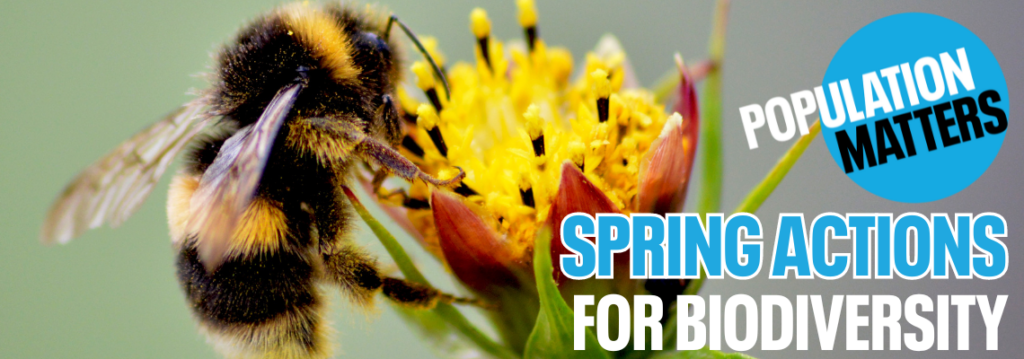
Spring actions for biodiversity
As part of this year’s Spring Action Month, Population Matters Fundraising Officer, Anthony, with a little help from our amazing supporters, suggests the following easy steps we can all take to support biodiversity at home – wherever that home is.

NEW AND DIVERSE PLANTING
A garden in full bloom is a delight! What’s even better is the more plant (and especially flowering plant) species present, the more insect, bird and animal life is being supported. Think about diverse planting. Even if your garden is a small space, any flowering plant will support insect life. Window boxes can also be a great micro way of planting when you don’t have a garden.
If you haven’t ‘grown you own’ before, why not take part in the Big Spring Plant and plant to reduce food miles while increasing local biodiversity. Beginning in Spring Action Month last year, I planted cherry tomatoes, strawberries, spring onions, lettuce, potatoes, and a variety of herbs – all in a small, raised bed at the front of my house, in an otherwise flagged area. The tomatoes and strawberries were so sweet, and I saved the potatoes for part of Christmas dinner. Growing them attracted all kinds of insect and animal life, including bees and other pollinators to a previously unused area.
LET IT GROW!
Grassed areas provide essential early year and first and second stage habitat for a myriad of insect life. Population Matters patron, Sir David Attenborough, is well aware of the major importance of such habitats:
Nowhere here is richer in wildflowers and insect pollinators than our traditional hay meadows. Sadly, in the last 60 years, we’ve lost 97% of this precious habitat . . . but meadows can be restored to provide a haven for wildlife. It’s all about the timing. Delaying mowing until mid-July allows birds and insects to complete their breeding and flowers to set their seed.
Sir David Attenborough, Population Matters patron
Population Matters supports #NoMowMay, encouraging our supporters to leave their lawns unmown to protect this early habitat for as long as possible. If you can have a ‘no mow summer’, even better! Leaving your lawn wild until the autumn will allow a variety of insects and animals to thrive.
PROVIDE FURTHER HABITAT OPPORTUNITIES
Going one step further from #NoMowMay, Woodland Manager and Population Matters supporter, Clive Ellis, suggests actively providing natural habitat in our outdoor spaces:
Just like No Mow May, we can change the way we see what might appear untidy. Leaving things rough is going to make the best habitat. Seeded grasses and plants left in over winter, the occasional rotting log and garden clippings left under a hedge. Woody things which can then be left undisturbed for beetles to live in and under.
Clive Ellis, Woodland Manager and Population Matters supporter, UK
AVOID PESTICIDES & CHEMICALS
This one is simple and common sense, but anything that directly kills one species will also affect others, not to mention poisons leeching into soil and groundwater.
Human encroachment into animal territory around the word is killing enough of nature and destroying habitats already. From the micro to the macro level, this is devastating and, ultimately, follows the path presented in our Vanishing Icons report.
CONSERVE & REUSE
Another fairly obvious habit which shouldn’t be overlooked! Of course, it isn’t spring all over the world. In the global south the seasons are tipping into autumn. Population Matters fundraiser, Braith, lives in New South Wales, Australia, and coming out of a long dry summer he is hoping and preparing for rain:
Following droughts and repeated dry summers in new South Wales, we are planning and preparing to collect and conserve rainwater right now. I’ve already sourced nine – already used and so recycled- 200 litre water drums.
Braith Bish, Population Matters fundraiser, Australia
final thoughts
I hope this gives you an idea of a few easy steps each of us can take to support biodiversity during Spring Action Month and beyond. Please search ‘biodiversity’ on our website and review our HumaNature campaign, including Insect Populations Matter, for further information.
Please also consider reading and engaging with our news and campaigns pages and taking part in other actions such as writing to your political representatives as part of our latest research into PHE / Population Health Environment.
Population Matters thanks our supporters, Clive Ellis in the UK and Braith Bish in Australia, for sharing Spring Actions they will be taking. To share your own, and possibly feature in a future blog, please drop me a line by email to anthony.howarth@populationmatters.org.
Wishing you well with whichever Spring Actions you choose to undertake this year!
